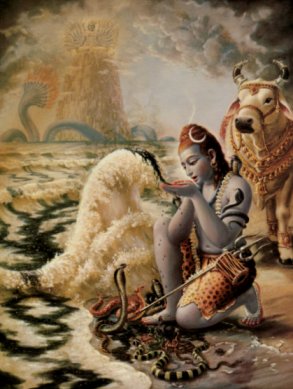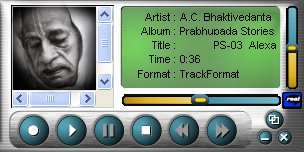|
|||
|
It has always been considered allowable for parents to tell children, “Do as I say, not as I do”. If we were to hear such an instruction from a preacher of religion however, the tendency for the vast majority would be to ignore whatever was said, especially so nowadays when the public no longer finds it acceptable for those in authority to sweep wrong doings under the carpet. In the Sanskrit language, a genuine religious leader is known as an acharya, which means ‘one who teaches by example’. So we find that His Divine Grace A.C.Bhaktivedanta Swami Prabhupada, who brought the religion of pure devotion to Lord Krishna from India to the rest of the world, is known as the ‘Founder Acharya of the International Society for Krishna Consciousness’. The behaviour of an acharya is exemplary at all times. An acharya never has a private life, for his dealings are always transparent and open. The acharya lives by the scriptures, and so earns the love and trust of everyone. These characteristics were visible in the life of Srila Prabhupada. With vast knowledge of the scriptures and a deep personal realization of the nature of the Absolute Truth, every action and word from an acharya is intended for the benefit of the world. Sometimes, however, there are occasions when a great spiritual authority will tell us, “Do as I say, not as I do”, and for good reason. The Srimad-Bhagavatam scripture gives an account from ancient times in which the demigods and demons, after a prolonged period of fighting, called a truce so as to jointly churn the ocean of milk, with the purpose of producing from it a nectar drink that would render them immune from death in battle. Before the nectar could appear, the churning produced from the depths a deadly poison that began to spread in all directions, threatening to destroy life everywhere. Feeling compassion for the sufferings of the living entities, the greatest of the demigods, Lord Shiva, agreed to drink the entire ocean of poison. Lord Shiva’s power is almost comparable to that of the Supreme Personality of Godhead Lord Sri Krishna Himself, and although there was such a great quantity of poison, he was able to reduce it to such a small amount that he was able to hold it in the palm of his hand. A few small drops fell from Lord Shiva’s hand and were drunk by many snakes, insects and plants, and this is the origin of all the poisonous creatures and toxic herbs in the world. Yet Lord Shiva himself remained unaffected by the poison, and Srila Prabhupada often cited this story as a warning to those desirous of ingesting toxic substances, such as alcohol and drugs. In his Srimad-Bhagavatam purports, Srila Prabhupada wrote, “Lord Shiva can do whatever he likes, but those who try to imitate Lord Shiva by smoking ganja and other poisonous things will certainly be killed by such activities.” In India a Vaisnava sadhu (a renounced holy man whose life is dedicated to the service of Lord Krishna) will be seen wearing saffron coloured robes, head shaved except for the tuft of hair at the back, and with two vertical lines of tilak on his forehead. Everyone will know that such a person should be free from all bad habits and vices. In the early part of the 20th Century, Srila Prabhupada’s guru, the great Vaisnava acharya Srila Bhaktisiddhanta Sarasvati Thakura, inaugurated a revolutionary preaching movement with the aim of spreading Krishna consciousness to every section of society in all parts of the world. Srila Bhaktisiddhanta swept away those rules and regulations governing the traditional life of a sadhu that hindered the active preaching of such a worldwide movement, for instance prohibitions against travelling overseas, travelling in motorised vehicles and the wearing of sewn clothing. One of Srila Bhaktisiddhanta’s disciples, Srila Bhakti Raksak Sridhara Maharaja, has told in his book ‘Sermons of the Guardian of Devotion’, that when the British Governor was invited to their temple in Mayapura, at that time it was arranged with a Calcutta hotel to bring appropriate food for the British guests, including even meat. |
Srila Bhaktisiddhanta Sarasvati then suggested a similar approach in foreign preaching also. Srila Sridhara Maharaja says: “I modestly protested that if the meat dishes, non-vegetarian dishes, were served in the temple area, it would bring criticism to the mission; to which he replied, ‘No, no! I decided all these things thousands of births ago. We have to do anything and everything for the service of Mahaprabhu.’” (Sri Chaitanya Mahaprabhu is the incarnation of Krishna who initiated the mass congregational chanting of ‘Hare Krishna’ five hundred years ago.) Of all the disciples of Srila Bhaktisiddhanta Sarasvati, one stands apart, both for his desire to fulfil the missionary order of his guru and his success in doing so. How Srila Prabhupada established the worldwide Hare Krishna movement is now part of history. Srila Prabhupada asked all his disciples to refrain from sinful activities, specifically the eating of meat, fish and eggs, the taking of intoxicants, engagement in illicit sex, and gambling. And yet, before coming to the West in 1965, Srila Prabhupada, like Srila Bhaktisiddhanta Sarasvati, was prepared, if need be, to relax the strict rules that govern the path of spiritual life. In the book ‘Prabhupada at Radha Damodara’ by Mahanidhi Swami, Srila Prabhupada’s good friend Srila Bhaktivedanta Narayana Maharaja recounts how Srila Prabhupada spoke of his desire to preach in Western countries: “I will establish boarding facilities for interested people. If they want, I will give meat also, and eggs also, and wine also. I believe that after hearing Hari Nam Sankirtan (the chanting of the holy names, Hare Krishna Hare Krishna Krishna Krishna Hare Hare, Hare Rama Hare Rama Rama Rama Hare Hare) and the siksha (instructions) of Sri Chaitanya Mahaprabhu, then certainly they will reject all these things, and surely they will become pure Vaisnavas.” Great personalities like Lord Shiva, or great acharyas, may sometimes transgress conventional behaviour, but this is the exception and not the rule. We should also note in this connection that those who see such behaviour in an exalted Vaisnava and, not understanding their higher motives, dare to criticize them out of pride, are certainly condemned by the scriptures. The serious student on the spiritual path must endeavour to strictly follow the regulative life, as set out by Srila Prabhupada. The Bhagavad-gita, the most widely read of all India’s religious texts, states that the enjoyment which is derived from contact of the senses with their objects “appears like nectar at first but poison at the end.” Conversely, the pursuit of self-realization “in the beginning may be like poison but at the end is just like nectar.” Our condition is compared to the person suffering from jaundice, for whom sweet things taste bitter. As one becomes cured of the disease, his good taste returns. Similarly, one who takes to the path of Krishna consciousness may initially have no taste for such things, but if he progresses with care and attention he will soon relish the greatest nectar. (It is not necessary to elaborate on how sense gratification ultimately reveals itself as poison, for most of us will have had some first hand experience of this.) So how are we to drink the nectar and avoid the poison? The first step, given to us by Srila Rupa Goswami, one of Sri Chaitanya Mahaprabhu’s closest disciples, is ‘Sri Guru-padasraya’, taking shelter at the feet of a pure Vaisnava guru. Such a qualified guru is one whose heart is suffused with loving devotional service to the Supreme Personality of Godhead, Lord Sri Krishna. From this first step, everything else will follow for one who is sincere. “The verdict of all revealed scriptures is that by even a moment’s association with a pure devotee, one can attain all success.” (Sri Caitanya Caritamrta Madhya 22.54). In the Srimad-Bhagavatam (3.25.25), Lord Krishna explains how He can be attained: “As a result of full-hearted association with pure devotees, one will get an opportunity to hear descriptions of My heroic deeds, which are like a nectarean tonic for the ears and the heart. By repeatedly relishing those topics through hearing and contemplation, one quickly and successively attains sraddha (faith), rati (attachment), and prema-bhakti (pure loving devotional service) towards Me, the ultimate end of the path along which mukti (liberation) is incidental.” |
||
|
|
Click here for Children's Pictures to this Article
Home
|
Newsletter
|
Harmonium Lessons
|
Hot News
|
Real Audio Page
Copyright © 2005-2007 Hare Krishna Centre for Vedic Studies (Leicester) Hare Krishna Hare Krishna Krishna Krishna Hare Hare ::: Hare Rama Hara Rama Rama Rama Hare Hare |
||


